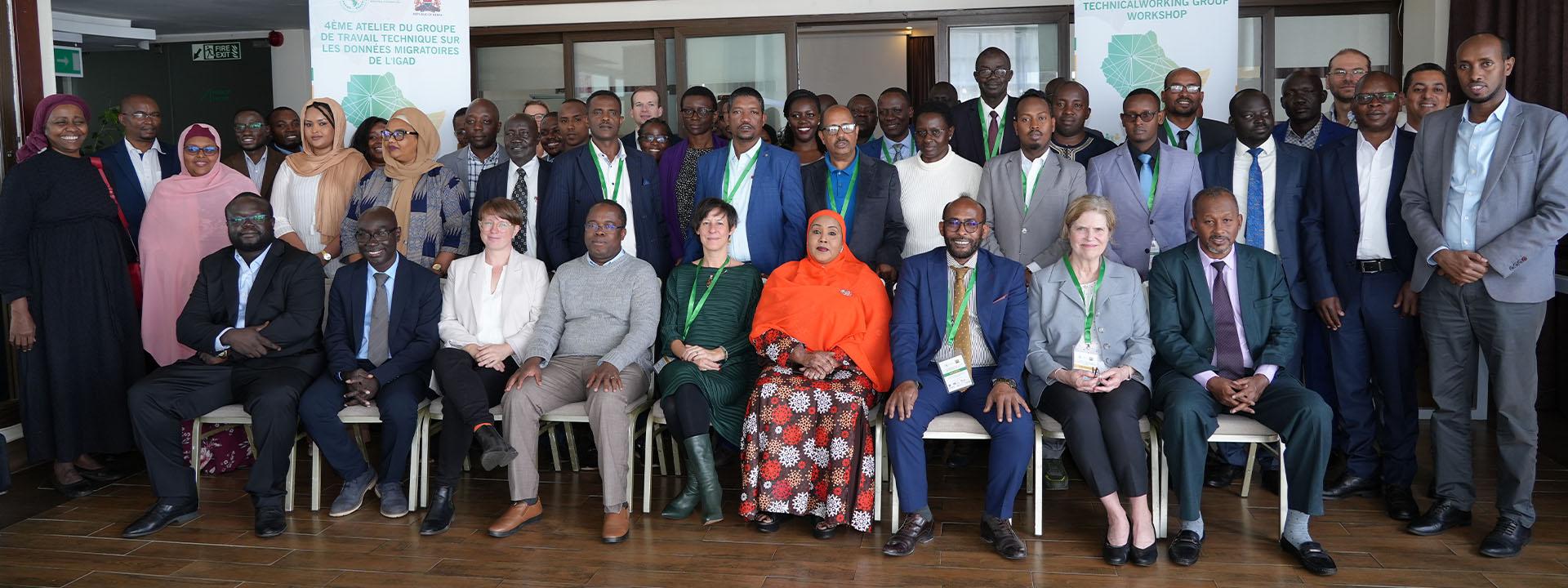July 10, 2023 (NAIROBI, Kenya): The Intergovernmental Authority on Development (IGAD) convened the 4th meeting of the Regional Migration and Displacement Data Technical Working Group from the 10th – 13th July, 2023 which has as a main objective to further advance the harmonized production and utilization of migration and displacement statistics across the region.
The four-day workshop hosted by the Government of Kenya was jointly organized by IGAD, Statistics Sweden, IOM, ILO, the African Union Commission and GIZ, brought together representatives from IGAD member states consisting of senior technical experts responsible for migration and displacement statistics.
The anticipated outcomes of the workshop included an assessment of Member States’ progress in implementing migration and displacement statistics activities, the formulation of a comprehensive action plan for their implementation, and the establishment of a roadmap for the completion of the second edition of migration statistics. This roadmap will also include a strategic plan for the collection and management of migration data in the region, outlining the way forward.
Speaking on behalf of Madame Fathia Alwan, Director of the IGAD Health and Social Development Division, Mr. Charles Ogolla, IGAD Head of Statistics, underlined the critical importance of experts and stakeholders in the field of migration and displacement statistics to come together to engage on matters of migration and displacement statistics.
“By fostering regional cooperation, harmonizing methodologies, and building technical capacity, the Regional Migration Data Technical Working Group continues to contribute to evidence-based policymaking, regional cooperation, and better understanding of the IGAD regional migration dynamics.”
On Behalf of the IGAD Chairperson, Madame Hasna Farah, from the Government of Djibouti, challenged the participants to ensure that migration and displacement statistics informed effective policy-making, promoting the protection of migrants’ rights, social integration, sustainable development, and regional peace. She expressed gratitude to the participants for their commitment to this cause and anticipated fruitful discussions, enriching exchanges, and renewed dedication to the promotion of reliable statistics.
Julia von Freeden, representative from GIZ, described the partnership between IGAD and GIZ as longstanding which will continue to center migration and displacement statistics as part of the second phase of the joint project ‘Improving migration and displacement policy in the IGAD region’.
Laura Nistri, Coordinator of the IOM Regional Data Hub East and Horn of Africa, emphasized that National Statistical Offices and other Ministries, Departments, and Agencies are the primary actors responsible for the collection, analysis, consolidation, and dissemination of migration data. She further expressed confidence that the efforts to harmonize national migration data systems across the region would aid in building evidence, supporting the most vulnerable, and realizing the transformative potential of migration for the IGAD region.
Speaking on behalf of the African Union Commission, Mr Samson Bel-Aube underlined the importance for IGAD to publicly make available migration and displacement data for evidence-based policymaking and programming in line with the African Charter on Statistics and the Second Strategy for the Harmonization of Statistics in Africa (SHaSA).
The IGAD Regional Migration Policy Framework (RMPF) gives the mandate to create and harmonize migration data. Its strategic area number eight addresses the need to reinforce the collection and analysis of migration and displacement data. The IGAD RMPF further identifies different categories of migration data needs. These categories include forced displacement, Irregular migration, human trafficking and smuggling, child migrant data, migration and development, migrant’s education data, and nexus between migration and health.

